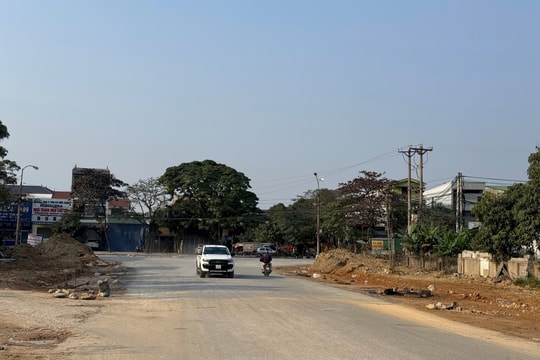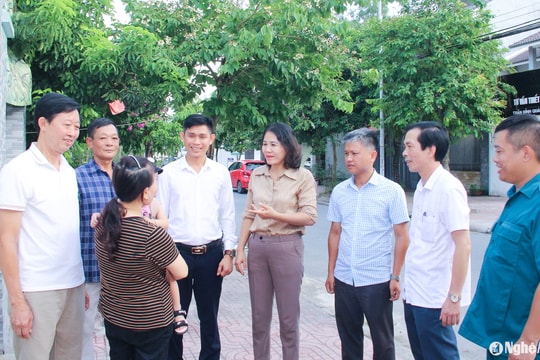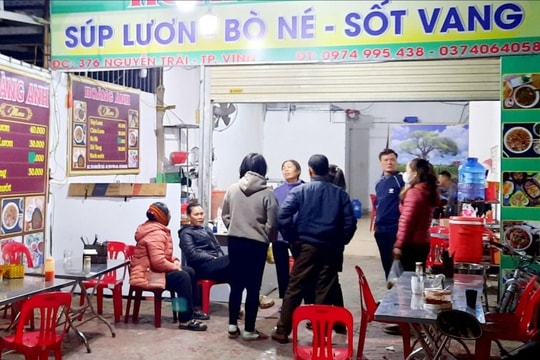Nghi Phu slaughterhouse should be moved out of residential areas soon.
(Baonghean) - Nghi Phu Commune (Vinh City) is the area with the most slaughterhouses in the whole province. However, waste treatment is not guaranteed, leading to serious environmental pollution, causing frustration for nearby households.
» Priest Nguyen Dinh Thuc incited parishioners
Wastewater stagnation
In early February 2017, Nghe An Newspaper received a petition from households in Nghi Duc commune (Vinh city) reporting on the situation of livestock slaughterhouses in hamlet 5, Nghi Phu commune discharging waste causing environmental pollution.
In the petition, the households stated that the waste discharged into the water source was polluted, turning it black and giving off a foul smell, and the rice fields could not be cultivated. On February 15, 2017, when reporters approached the location, the residents also recorded the above situation.
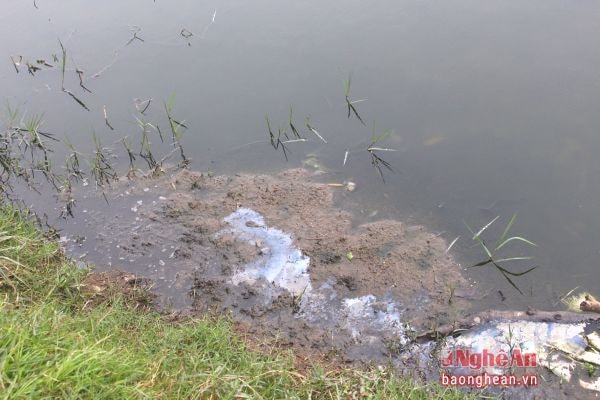 |
| Livestock waste is dumped in Nghi Duc commune. Photo: Phuong Thao |
It is known that during the recent Lunar New Year, the number of livestock gathered at slaughterhouses in Nghi Phu commune increased. At its peak, 300-400 pigs, 100 buffaloes and cows were slaughtered here per day; making the pollution situation more serious. Unable to bear the stench, Nghi Duc commune residents built embankments to prevent wastewater from being discharged into Nghi Duc commune's administrative boundaries. This caused waste to accumulate, causing pollution in Nghi Phu commune, leading to conflicts between residents of the two communes.
This is not the first time that Nghi Duc commune residents have made a petition on this issue. Previously, on September 12, 2016, Nghi Duc commune People's Committee also sent Document No. 181/UBND to Vinh city People's Committee, reflecting the situation of some households slaughtering livestock in hamlet 4, Nghi Phu commune, illegally dumping waste into deep rice fields in Xuan Duc hamlet, Nghi Duc commune, causing environmental pollution. On January 24, 2017, Nghi Duc commune People's Committee continued to send to Vinh city People's Committee Document No. 22/UBND with the petition of the residents. The document clearly states: “In the Boi field area, Xuan Duc hamlet, Nghi Duc commune, adjacent to hamlet 5, Nghi Phu commune, the situation of waste from buffaloes, cows and pigs being dumped into the fields causes serious environmental pollution. According to the petition of the people of Xuan Duc hamlet, the People's Committee of Nghi Duc commune conducted an inspection and learned that it was due to wastewater from the buffalo, cow and pig slaughterhouse in hamlet 5, Nghi Phu commune.”
Talking to reporters, Mr. Hoang Thanh Tung - Deputy Secretary of the Party Committee, Chairman of the People's Committee of Nghi Phu commune admitted that it is true that waste from the slaughterhouse located in the area causes environmental pollution, affecting the residential area as reported. This is a slaughterhouse built according to the city's policy with the purpose of gathering households engaged in slaughtering, minimizing environmental pollution caused by spontaneous slaughterhouses with poor drainage systems. However, currently, the daily flow of gathering and exporting has increased, so the environmental sanitation around the slaughterhouse is not guaranteed.
The main cause was determined to be the inadequacy in the drainage system design when the drainage direction is to the West but the underground sewer system and ditches slope down to the East, causing the manure and wastewater from the slaughterhouse to stagnate and not be able to drain through the main sewer. In addition, some households do not bring livestock to the centralized slaughterhouse but slaughter them on a small scale at their own homes and discharge the waste into the ditch system without treatment, causing more foul odor.
When asked about the local government’s response to this situation, Mr. Tung said that before the Lunar New Year of Dinh Dau 2017, the commune contacted a Japanese alkaline water production company to request support of 40 liters of alkaline water to decompose waste and eliminate odors at wastewater overflow points. However, this is only a temporary solution.
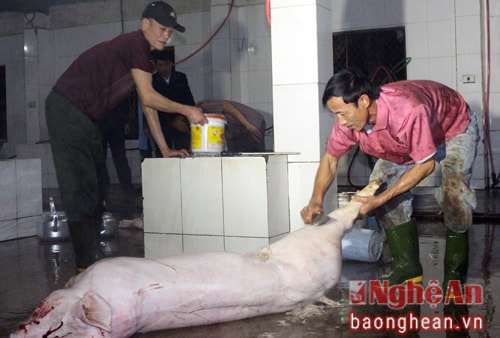 |
| Slaughter of livestock during Tet holiday at Nghi Phu slaughterhouse is overloaded. Photo: Phuong Thao |
In addition, Nghi Phu commune also requires hamlets to make a list of households that practice livestock slaughtering, and require them to sign a commitment not to violate regulations on ensuring environmental hygiene; if violations occur, they will be resolutely handled. On February 14, 2017, the commune also imposed an administrative fine of 1.5 million VND on the family of Mr. Nguyen Van Son (Hamlet 8, Nghi Phu commune) for violating related regulations such as arbitrarily slaughtering livestock at home, not conducting quarantine, unsanitary slaughtering procedures, etc.
However, Mr. Tung also expressed many difficulties in inspection and handling beyond the control of the commune-level authority. The slaughter of livestock and illegal dumping of waste are often carried out at night, making them difficult to detect. "Building a slaughterhouse in a residential area without ensuring adequate wastewater treatment systems is obviously unsanitary. Therefore, we hope that the province will have synchronous infrastructure investment to thoroughly solve this problem, or have a plan to relocate the slaughterhouse to another location, far from residential areas so as not to affect the living environment," said Mr. Tung.
Slaughterhouse will be moved out of residential areas
Faced with this situation, Mr. Le Minh Tuan - environmental officer, Department of Natural Resources and Environment of Vinh city said that through regular inspections and feedback from the people, the city government has also grasped the current situation at the slaughterhouses. The cause of pollution is determined by two factors. First, the wastewater treatment system at the slaughterhouses does not ensure hygiene; second, the people's awareness of environmental protection is not good.
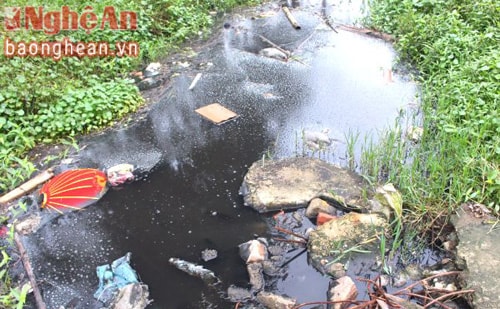 |
| Waste overflowing into canals causes serious pollution. Photo: Phuong Thao |
Regarding the proposal related to investing in synchronous infrastructure to have a guaranteed wastewater treatment system, Mr. Tuan said that this is difficult because the slaughterhouse is located in a residential area, the construction will be hindered by the design of important roads, houses, and canals. Therefore, Vinh city has considered the option of moving the slaughterhouse to another location, ensuring environmental hygiene criteria. "Currently, a survey has been conducted on the construction site of the new slaughterhouse, in the near future the slaughterhouse located in Nghi Phu commune will be moved out of the residential area," Mr. Tuan affirmed.
In the immediate future, to minimize the impact on the environment, the City People's Committee has requested the Nghi Phu Commune People's Committee to inspect the collection and treatment of waste from livestock slaughtering activities in the area, to propagate and mobilize people to slaughter at centralized slaughterhouses and to collect and treat waste according to regulations. At the same time, the Vinh City Police Department has been assigned to direct the Environmental Crime Prevention Police Team to implement professional measures to inspect, detect and strictly handle the act of illegally dumping waste from slaughtering activities causing environmental pollution.
Thus, in the long term, planning the construction site of new slaughterhouses away from residential areas, ensuring that environmental factors have been taken into account. However, in the face of the current serious pollution situation, it is required that people who practice livestock slaughtering must raise their awareness of environmental protection responsibilities, and not illegally dump untreated waste, affecting residential areas. The authorities need to strengthen inspection and close supervision; resolutely handle violations to minimize violations, in order to limit the negative impact of livestock slaughterhouses on the surrounding living environment.
Decree 155/2016/ND-CP regulating administrative sanctions for violations in the field of environmental protection officially took effect from February 1, 2017. In the new decree, the Government decided to increase the fines many times for a series of violations of public hygiene. The maximum fine for an administrative violation in the field of environmental protection is 1 billion VND for individuals and 2 billion VND for organizations. |
Phuong Thao

